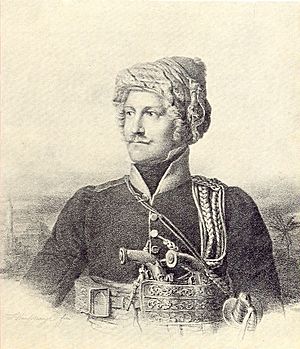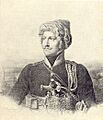Thomas Gordon (British Army officer) facts for kids
Quick facts for kids
Thomas Gordon
|
|
|---|---|

Portrait of Thomas Gordon
|
|
| Born | c. 1788 Cairness House, Aberdeenshire, United Kingdom |
| Died | 20 April 1841 Cairness House, Aberdeenshire, United Kingdom |
| Allegiance |
|
| Service/ |
|
| Rank | Colonel (Hellenic Army) |
| Battles/wars | Greek War of Independence
|
| Awards | Grand Commander of the Order of the Redeemer |
Major-General Thomas Gordon (1788 – 20 April 1841) was a British army officer and a historian. He is best known for his important role in the Greek War of Independence in the 1820s and 1830s. He also wrote a detailed History of the war, which was published in 1832.
Contents
Early Life and Adventures
Thomas Gordon was born around 1788 at Cairness House in Lonmay, Aberdeenshire, Scotland. His parents were Charles Gordon and Christian Forbes. He went to school at Eton College and then studied at Brasenose College, Oxford University.
From 1808 to 1810, he served in the Scots Greys, a famous British cavalry regiment. In May 1810, he left the British Army to travel. He visited many places, including Ioannina in Greece, where he met Ali Pasha, a local ruler. Between 1810 and 1812, he explored Athens, Constantinople (now Istanbul), Thessaloniki, and parts of Turkey, Persia (modern-day Iran), and North Africa.
In 1813, he worked as a captain with the Russian Army. He was part of Count von Walmoden's army in Germany. In early 1814, he returned home to Cairness House. In 1815, he traveled again to Constantinople, where he married Barbara Kana.
Helping Greece Fight for Freedom
Gordon returned to Greece in 1821 when the Greek War of Independence began. This was a fight for Greece to become free from the Ottoman Empire. He served as a chief of staff (a senior helper) for Demetrios Ypsilantis in the Peloponnese region.
He took part in the Siege of Tripolitsa, a major battle. After the city was captured, he strongly disagreed with the Greek soldiers who killed many Turkish people. Because his protests were ignored, he left the army for a while.
In November 1822, the Greek government asked him to return, but he said no. Instead, he joined the Greek committee in London, which was helping the Greek cause. He gave money and military supplies. He also supported the famous poet George Byron, 6th Baron Byron (Lord Byron) joining the fight in Greece.
Return to Greece in 1826
In 1826, the Greeks asked Gordon to come back again. They wanted his help to unite their forces and improve military training. He arrived in Nafplion in May 1826. He found that the Greek leaders were arguing among themselves, which made it harder to fight the Turks. Gordon helped prevent their regular army from breaking apart.
Later, some local Greek leaders took $10,000 from Gordon's funds to give to their own soldiers. By the end of 1826, Gordon had used all the money that the Greek committee in London had given him to help the war effort.
Leading the Piraeus Expedition
In 1827, Gordon became the commander of an important mission to Piraeus, near Athens. He was a brigadier, leading Greek soldiers and foreign volunteers. His goal was to help the Greek fighters who were trapped in the Acropolis in Athens. Gordon successfully landed his troops at Faliro, surprising the Turkish commander.
Gordon found that the Greeks in the Acropolis could still hold out. He wanted to resign but agreed to stay if he received more supplies and could make his own decisions. He remained in command until General Richard Church arrived in April and took over the main command.
On April 16, 1827, Church made Gordon the director-general of the army. He likely stayed in this role until the Greeks were defeated on May 6. However, the Greeks continued to fight, and with help from the Battle of Navarino and support from France, Russia, and Britain, Greece eventually became an independent country. In July 1827, Gordon went back to Scotland.
Exploring History and Writing Books
Thomas Gordon returned to Greece in 1828. From 1828 to 1831, he stayed in Argos with his secretary and another historian, George Finlay. They worked at the site of the ancient Heraeum ruins near Argos.
While in Argos, Gordon gathered many written and spoken stories for his book about the Greek revolution. He also built a beautiful house there, which looked like his home, Cairness House, but was smaller. He returned to Cairness in 1831 and finished his book in 1832. It was praised for being very detailed and accurate.
Final Military Role in Greece
When Prince Otto became the new King of Greece, Gordon returned to Greece in 1833. He was made a colonel in the Hellenic Army. That year, he helped clear out bandits (robbers) in western Greece who were supported by Turks from across the border. Gordon could speak Turkish language very well, which surprised the local Turkish leaders and helped a lot in talks. He also led a military court that tried rebels in the Messenian area.
Because of his poor health, Gordon left the army in February 1839 and went back to Cairness. He made one more short visit to Greece in 1840.
Awards and Recognition
Thomas Gordon received many awards for his service. The Greeks made him a Grand Commander of the Order of the Redeemer when he retired.
He was also a member of many important groups that studied history and science. These included the Royal Society (1821), the Society of Antiquaries of Scotland (1828), and the Royal Asiatic Society (1834). In Greece, he joined the Society for Natural History (1837) and the Archaeological Society (1840).
Images for kids
 | Georgia Louise Harris Brown |
 | Julian Abele |
 | Norma Merrick Sklarek |
 | William Sidney Pittman |


